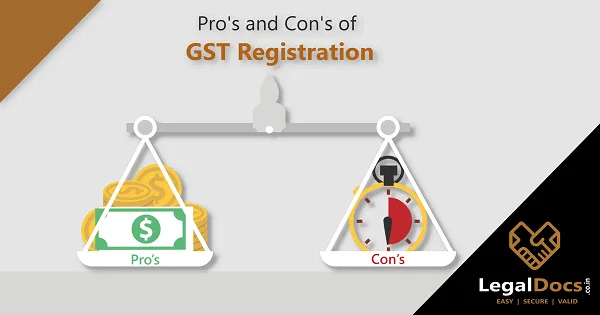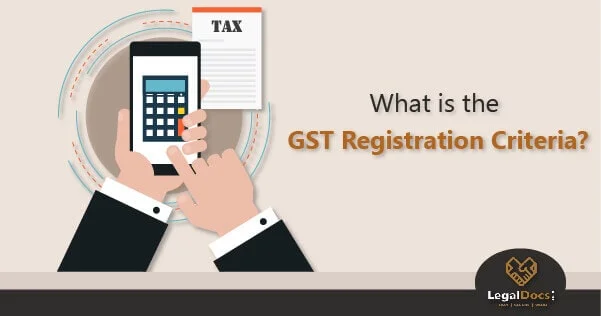Pros and Cons of GST Registration
GST Regime in India
Before the introduction of Goods and Service Tax(Often referred as GST), Indian consumers paid various taxes on goods and services. Since the constitution allows both the center and state to levy taxes, each state levied their own taxes on the goods coming into their domination for the purpose of sale and consumption. Whereas, the center levied taxes of its manufacture. This system burdened the same good with multiple taxations. There was no way available to offset the taxes that were previously paid at each stage. To fill this gap GST Registration came into the picture.
After 13 long year journey, since the idea of GST was first discussed in the report of the Kelkar Task Force on indirect taxes, GST was finally introduced. One hundred and twenty-second amendment in the constitution lead to the introduction of Goods and Services Tax Bill in 2014. The bill proposed the implementation of GST regulation that emphasized on the imposition of Value Added Tax on sale, manufacture, and use of different goods and services. The Act came into operation in 2016 and the implementation of the same began on July 1, 2017.
GST is levied at all stages starting from manufacture to final consumption. In simple words, only value addition will be taxed. The GST system allows the final consumer to bear the burden of tax as it is charged by the last dealer in the supply chain. Thus, everyone else enjoys the opportunity to set off taxes paid at the previous stage. Such a system is capable of preventing multiple taxations occurring on certain goods. Further, it ensures transparency of the price of the product and the taxes one is paying. In earlier system, a consumer was not aware of the total amount of taxes one pays for a product, other than the VAT charged for the same.
GST Registration
According to the GST regulation, businesses with a turnover exceeding the threshold turnover are required to undergo GST registration process. The Online GST Registration is mandatory for those;
Individuals registered under the laws existing before the implementation of GST, such as; excise, VAT, service tax etc.
Business with a turnover above the threshold limit of 20 lakh rupees. The limit is 10 lakh rupees for some states like Jammu and Kashmir, Himachal Pradesh, Uttarakhand, and North Eastern states of India.
Casual taxable person or Non-Resident Indian taxable person.
Agents of a supplier.
Input Service Distributor.
Those paying taxes under the reverse charge mechanism.
E-commerce operators.
A person other than a registered taxable person, who is supplying online information and database access or retrieval services from a place outside India to a person in India
GST Calculation in India
The calculation of the amount of GST that is payable at the time of filing of return is complex and may require professional assistance at times. It is important for a taxpayer to consider all the aspects and provisions, such as;
Reverse charge
Exempted supplies
Inter-state and intra-state supplies.
Eligibility for input tax credit.
The calculation of GST must be done correctly in order to avoid penalty. An interest of 18\\% is charged on the shortfall, in case one pays less than the amount one is liable to pay.
GST Advantages
The pro’s of GST registration can be summarized as:
Easy compliance: The government has launched GST Network (GSTN). It is a comprehensive information technology system that handles all the services for taxpayers, including; registration, returns, payments, and other services. This helps to make the GST compliance easy and transparent.
Uniformity of tax rates and tax structure: the tax rates and tax structure is common across the country. Although there is a three-tier system that involves; Central GST, State GST or Union Territory GST, and Integrated GST, the type of return that one needs to file depend only upon the nature of the business. It is independent of the choice of place of pursuing a business.
Removal of cascading effect: The hidden costs involved in doing business are reduced. The GST system ensures tax credits throughout the value addition chain across boundaries of States. Thus, ensuring minimal cascading of taxes.
Competitiveness improved: As the transaction cost is reduced while pursuing the business has eventually improved competitiveness for trade and industry.
Benefits to manufacturers and exporters: GST has subsumed the major taxes that were earlier charged by the central and the state governments. Thus, reducing the cost of manufacturing the goods and services locally. This has increased the competitiveness of goods and services manufactured in India for the purpose of sale in the international market. The Indian exports have boomed. Further, the compliance costs have reduced due to the uniformity of tax rates and procedures across the country.
GST Disadvantages
The cons of GST registration can be summarized as:
The control of businesses has been shifted to the central and state governments for all those businesses binding the laws. Thus, the complexity for businessmen has increased across the nation.
In several cases, there is a mismatch of information on those businessmen who are trying to claim input tax credit. There are greater chances for chaos.
Many things related to the disabled people, such as; braille paper, typewriter, hearing aid, and motorized wheelchair have been now included in the taxation system through the imposition of GST.
The government, on one hand, wants to push banking services in India, however, on the other hand, with the imposition of GST higher rates have been implemented in banking and insurance services.
The discount and reward schemes that were previously offered are also impacted. The goods are now being taxed on pre-discount rates which were earlier taxed on post-discount prices. This has also lead to an impact on the consumption pattern of the goods and services.
The pro’s and con’s of GST Registration are similar to two sides of the coin. They may appear to be different, yet they are closely related. With the inception of GST system, both the government and the taxpayers are working to make the GST compliances of effective and efficient.
Are you looking for GST Registration in India?
Legaldocs will guide you in getting all necessary Documents and Registration required to get GST Registration in India, Please click on the following link to connect with our consultants.
Apply for GST Registration Knowledge Center
Knowledge Center


























LEAVE A REPLY: